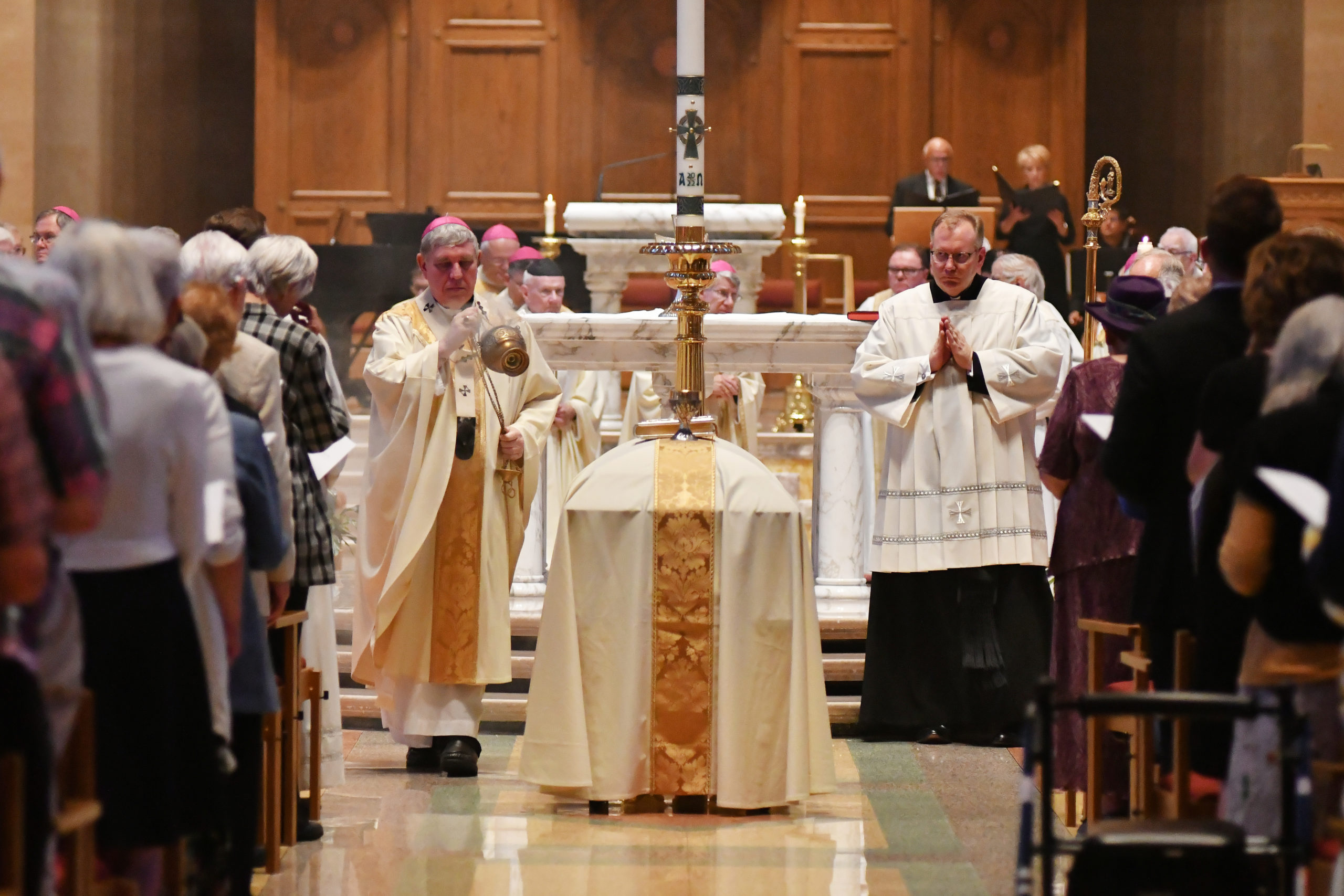
The funeral for former Milwaukee Archbishop Rembert G. Weakland was held Aug. 30 at the Cathedral of St. John the Evangelist, with Archbishop Jerome E. Listecki presiding. (Photo by David Bernacchi)
One of the main tenets of the Catholic faith is Jesus died on the cross for our sins — no matter how severe — and we are a people encouraged to practice forgiveness.
So, with the mixed feelings of the passing of Archbishop Rembert G. Weakland, O.S.B., who died Aug. 22 at Clement Manor, Archbishop Jerome E. Listecki reminded those in attendance at Weakland’s funeral of those pillars of the Church.
Weakland, the ninth Archbishop of Milwaukee, had his 25-year tenure end in controversy after an illicit payment of $450,000 to a former lover and his role in covering up abuse by clergy were revealed. There are still some who hold hard feelings over those revelations, including a small group of survivors and activists that gathered outside the Cathedral of St. John the Evangelist for Weakland’s Aug. 30 visitation and funeral Mass.
Archbishop Listecki was joined by 10 other bishops and dozens of priests and deacons, many of whom were ordained while Weakland was archbishop from 1977-2002.
“Mistakes are made; judgments are made,” Archbishop Listecki said. “But they are done in the shadow of the cross. We hold that cross before us because the cross is (symbolic of) God’s love and forgiveness and mercy. We approach the cross as we always should do — as sinners. Have that love conquer death. It’s who we are as a people.”
Archbishop Listecki did note that among Weakland’s lasting legacies for the archdiocese was a strengthening of the laity, the results of which are still felt today, and the many priests in attendance who joined that brotherhood during Weakland’s tenure.
Fr. Steven Avella, a member of the history department at Marquette University, gave a nearly 20-minute homily that highlighted some of Weakland’s achievements and pet projects during his time as archbishop. However, he also addressed the cloud hanging over the proceedings.
“His tenure was challenging as was that of every one of his predecessors — albeit in different ways,” Fr. Avella said. “Hanging over this particular funeral are the memories of his mistakes, which were there for everyone to see. Some were personal to him. Others are shared by his fellow bishops and priests. While we are grateful for the time he spent with us, and many of us loved him — some did not. We cannot dismiss their just anger even as we still try to make sense of it all. People were hurt, lives shattered and disillusioned. With the perks and power of leadership comes the burden of accountability for serious mistakes. For us here in Milwaukee, these must still work themselves out. Grief and anger have no timetable. Neither do forgiveness and reconciliation.”
Fr. Avella also noted the power of Christ’s resurrection.
“As it did for the early Christians, the gospel of the Transfiguration reminds us that ‘the sufferings of this life are as nothing compared to the glory that is to be revealed,’” Fr. Avella said.
He concluded his homily by speaking of the dual nature of Weakland.
“Few people were neutral about Archbishop Weakland — even today,” Fr. Avella said. “He was a challenging man who believed that honest debate and discussion was part of what it meant to be an American bishop. Brother bishops, scholars and ordinary people from around the globe sought his advice. There were those who valued him in the loneliness of his declining years. His was a complicated, and at times sinful, life — true of all of us, but especially true of those in high places. There will be some who say perhaps he didn’t listen enough. But he tried to listen and accompany us. He believed we were ‘A Pilgrim People,’ affirmed that we were all equal in love. This is worth remembering.”
Out of respect for victims of clergy sexual abuse and to limit the possibility of triggering memories caused by high-profile coverage of Weakland’s death, members of the mainstream media were barred from the funeral Mass.
Cardinal Timothy Michael Dolan, the current Archbishop of New York and Weakland’s successor as Archbishop of Milwaukee, sent his regrets on not being able to attend the funeral. His presence was required in Rome for the Consistory summoned by Pope Francis. Cardinal Dolan said he intended to offer a Mass for Weakland’s soul at San Anselmo on the Aventine, a place where Weakland spent many years and which he cherished.
Weakland will be buried at St. Vincent Archabbey Cemetery in Latrobe, Pennsylvania.
